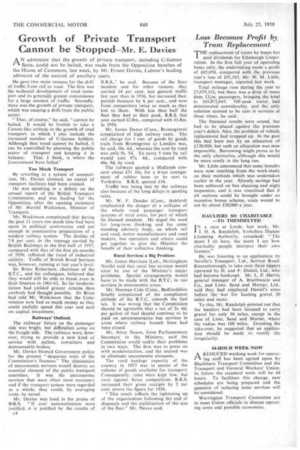Growth of Private Transport Cannot be Stopped-Mr. E. Davies A
Page 44

If you've noticed an error in this article please click here to report it so we can fix it.
N admission that the growth of private transport, including C-licence r-k fleets, could not be halted, was made from the Opposition benches of the House of Commons, last week, by Mr. Ernest Davies, Labour's leading advocate of the control of ancillary users.
He gave two main reasons for the drift of traffic from rail to road. The first was the technical development of road transport and its generally greater convenience for a large amount of. traffic. Secondly, there was the growth of private transport, which was causing a drift from the public Sector.
"That, of course," he said, "cannot be halted. It would be foolish to take a Canute-like attitude to the growth of road transport, in which I also, include the increased number of C-licence holders. Although that trend cannot be halted, it can be controlled, by planning the public sector of transport and keeping it in
balance. That, I think, is where the Government have failed."
Too Much Transport By reverting to a system of competi:ion, Mr. Davies claimed, an excess of transport facilities had been created.
He wasspeaking in a debate on the annual report of the British Transport Commission, and was leading for the Opposition, after the opening statement of Mr.. Harold Watkinson, Minister of Transport.
.Mr. Watkinson complained that during the past 11 years too much time had been spent in political controversy and not enough in constructive preparation of a modern railway system. The decline of 7.8 per cent, in the tonnage carried by British Railways in the first hall' of 1957, compared with that of the first six months of 1956, reflected the trend of industrial activity. Traffic of British Road Services was, however, running at last year's level.
Sir Brian Robertson, chairman of the B.T.C., and his colleagues, believed that they would still be able to break even in their finances in 1961-62. So far rnoderniZation had yielded greater returns than anybody had thought possible. Sir Brian had told Mr. Watkinson that the 'Commission now had as much money as they could usefully spend this year and next on capital investment.
Railways' Outlook The railways' future on the passenger side was bright, burdiffieulties arose on the freight side. Thefrailways were, however, trying to provide a new kind of service with pallets, container's and demountable bodies.
Mr. Davies blamed Government policy for the present "desperate state of the Commission's finances." The elimination of uneconomie-services would destroy an essential element of the public transport amenities. If was the uneconomic services that were often most necessary and if the transport system were regarded as a whole, they could, by averaging costs, be .saved.
Mr. Davies was loud in his praise of !-` If ever nationalization were jostified, it is justified by the 'results of c4 B.R.S.," he said. Because of the Suez incident and for other reasons, they carried 14 per cent. less general traffic. lastyear than. in 1956, but increased their parcels business by 6 per cent., and won from competitors twice as much as they lost to them. With less than half the fleet they had at their peak, B.R.S. last year earned £2.8m., compared with £1.8m. in 1956.
Mr. James Dance (Cons., Bromsgrove) complained of high railway rates. The rail charge for 1 cwt. of goods by goods train from Bromsgrove to London was, he said, 10s. 6d., whereas the cost by road was only 9s. 5d. To carry 5 tons by rail would cost 97s. 4d., compared with 40s. 9d. by road.
The railways quoted a Midlands concern about £31 10s. for a 4-ton consignment of rubber hose to be sent to Yorkshire. B.R.S. quoted £16.
Traffic was being lost by the railways also because of the long delays-in quoting rates, Mr. W. F. Deedes (Cons., Ashford) emphasized the danger' of a collapse of the whole road passenger transport systems of rural areas, for part of which he blamed taxation. He urged the need for long-term thinking and for some' standing advisory body, on which rail and road, motor manufacturers and road makers, bus operators and others could get together to give the Minister the benefit of their collective thinking.
Rural Services a Big Problem
Mr. James Harrison (Lab., Nottingham North) said that rural bus services would soon be one of the Minister's major problems. Special arrangements would haveto be made with the B.T.C. to run services in uneconomic areas.
Mr. Norman Cole (Cons., Bedfordshire South) complained of the complacent attitude of the B.T.C. towards the fuel tax. It was wrong that the Commission should be agreeable that a tax of 2s. 6d. per gallon of fuel should continue to be paid on unremunerative bus services in areas where railway branch lines had been closed.
Mr. Airey Neave, Joint Parliamentary Secretary to the Ministry, said the Commission could tackle their problems in two ways. The first was to press on with modernization, and the second was to eliminate uneconomic elements.
The road haulage capacity of the country in 1957 was in excess of the volume of goods available for transport. Consequently, rates were kept low, but even against fierce competition. B.R.S. increased their gross receipts by 2 per cent, above the figure for 1956.
"This result reflects the tightening up of the organization following the end of disposals and the stabilization of the size of the fleet," Mr. Neave said.
















































































































